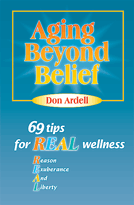Aging Beyond Belief, Tip 58
Stability, Agility, and Balance: Falling down is not good for you, so take steps to prevent it
Falls are usually no big deal during the early and even middle years of life. Some are, of course, but most of us, especially guys, grow up playing sports where falling is part of the game, as is the process of actually inducing falls among each other (like when playing football). But, falling down for senior adults, particularly those with limited mobility to begin with, is a serious matter. Doing so may lead to broken bones, which will interfere with your active wellness lifestyle and put a crimp in your social life. Consider these precautions:
- Create a safe home environment that reduces the risks of falls.
- Install devices that make life easier, if and when needed, such as grab bars and railings in strategic locations.
- Make sure your home and work environments are well lighted.
- Have your vision and hearing checked regularly.
- Keep plenty of Viagra or other safe, performance enhancing aids on hand, just in case. (No, this tip has nothing to do with preventing falls.)
 In the first sentence of this tip, above, I used the phrase “senior adult.” What, exactly, is a senior adult? When does the word “senior” officially attach to the word “adult” in references to you? There is no official word on this or consensus, but here are indicators of when you have gone over to “the other side,” so to speak.
In the first sentence of this tip, above, I used the phrase “senior adult.” What, exactly, is a senior adult? When does the word “senior” officially attach to the word “adult” in references to you? There is no official word on this or consensus, but here are indicators of when you have gone over to “the other side,” so to speak.
- When you wife says, “Let’s go upstairs and make love, you reply: Honey, I can’t do both!”
- When your friends compliment you on your new alligator shoes— and you’re barefoot.
- When the porn you bring home is called “Debby Does Dialysis.”
- When your doctor doesn’t give you x-rays anymore, but just holds you up to the light.
- When a babe catches your fancy and your pacemaker sets off the garage door.
- When you remember the time the Dead Sea was only sick.
(These lines have been attributed to varied comedians, largely because they stole them from each other.)
Naturally, falling down is no laughing matter; serious efforts should be made to prevent such disasters. Outside areas can be designed to be safer, as well, though this requires public action beyond the initiative of individual seniors. Examples of safe designs are smooth and attractive walking paths that separate cyclists, skaters and rollerbladers. Of course, some senior adults ARE bikers, skaters, and rollerbladers, but such senior adults are vigorous and less needful of protection.
The number one safeguard against falls is to create, sustain, and continuously fine-tune a healthy lifestyle. This will enable you to enter senior adulthood in top form and to extend the period of quality life to the greatest extent possible.
However, even if you are the wellest person on earth or a serious candidate for such an award, if ever one should be created, the fact is you are still going to grow old, eventually—assuming you don’t get hit by a bus or carry genes programmed to do you in before you reach a state of semi-frailty, senility, or worse. And no matter how much you exercise to build bone and cardiovascular strength, remain flexible, work out vigorously on a daily basis to insure muscular support for bones, and otherwise do all that self-management skill building and behavior invites, at some point these suggestions will prove beneficial.
-from Aging Beyond Belief, by Don Ardell

